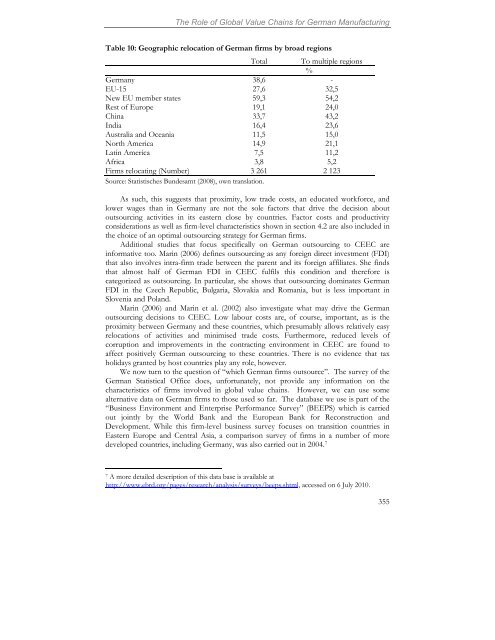The Role of Global Value Chains for German Manufacturing
The Role of Global Value Chains for German Manufacturing
The Role of Global Value Chains for German Manufacturing
Create successful ePaper yourself
Turn your PDF publications into a flip-book with our unique Google optimized e-Paper software.
<strong>The</strong> <strong>Role</strong> <strong>of</strong> <strong>Global</strong> <strong>Value</strong> <strong>Chains</strong> <strong>for</strong> <strong>German</strong> <strong>Manufacturing</strong><br />
Table 10: Geographic relocation <strong>of</strong> <strong>German</strong> firms by broad regions<br />
Total To multiple regions<br />
%<br />
<strong>German</strong>y 38,6 -<br />
EU-15 27,6 32,5<br />
New EU member states 59,3 54,2<br />
Rest <strong>of</strong> Europe 19,1 24,0<br />
China 33,7 43,2<br />
India 16,4 23,6<br />
Australia and Oceania 11,5 15,0<br />
North America 14,9 21,1<br />
Latin America 7,5 11,2<br />
Africa 3,8 5,2<br />
Firms relocating (Number) 3 261 2 123<br />
Source: Statistisches Bundesamt (2008), own translation.<br />
As such, this suggests that proximity, low trade costs, an educated work<strong>for</strong>ce, and<br />
lower wages than in <strong>German</strong>y are not the sole factors that drive the decision about<br />
outsourcing activities in its eastern close by countries. Factor costs and productivity<br />
considerations as well as firm-level characteristics shown in section 4.2 are also included in<br />
the choice <strong>of</strong> an optimal outsourcing strategy <strong>for</strong> <strong>German</strong> firms.<br />
Additional studies that focus specifically on <strong>German</strong> outsourcing to CEEC are<br />
in<strong>for</strong>mative too. Marin (2006) defines outsourcing as any <strong>for</strong>eign direct investment (FDI)<br />
that also involves intra-firm trade between the parent and its <strong>for</strong>eign affiliates. She finds<br />
that almost half <strong>of</strong> <strong>German</strong> FDI in CEEC fulfils this condition and there<strong>for</strong>e is<br />
categorized as outsourcing. In particular, she shows that outsourcing dominates <strong>German</strong><br />
FDI in the Czech Republic, Bulgaria, Slovakia and Romania, but is less important in<br />
Slovenia and Poland.<br />
Marin (2006) and Marin et al. (2002) also investigate what may drive the <strong>German</strong><br />
outsourcing decisions to CEEC. Low labour costs are, <strong>of</strong> course, important, as is the<br />
proximity between <strong>German</strong>y and these countries, which presumably allows relatively easy<br />
relocations <strong>of</strong> activities and minimised trade costs. Furthermore, reduced levels <strong>of</strong><br />
corruption and improvements in the contracting environment in CEEC are found to<br />
affect positively <strong>German</strong> outsourcing to these countries. <strong>The</strong>re is no evidence that tax<br />
holidays granted by host countries play any role, however.<br />
We now turn to the question <strong>of</strong> “which <strong>German</strong> firms outsource”. <strong>The</strong> survey <strong>of</strong> the<br />
<strong>German</strong> Statistical Office does, un<strong>for</strong>tunately, not provide any in<strong>for</strong>mation on the<br />
characteristics <strong>of</strong> firms involved in global value chains. However, we can use some<br />
alternative data on <strong>German</strong> firms to those used so far. <strong>The</strong> database we use is part <strong>of</strong> the<br />
“Business Environment and Enterprise Per<strong>for</strong>mance Survey” (BEEPS) which is carried<br />
out jointly by the World Bank and the European Bank <strong>for</strong> Reconstruction and<br />
Development. While this firm-level business survey focuses on transition countries in<br />
Eastern Europe and Central Asia, a comparison survey <strong>of</strong> firms in a number <strong>of</strong> more<br />
developed countries, including <strong>German</strong>y, was also carried out in 2004. 7<br />
7 A more detailed description <strong>of</strong> this data base is available at<br />
http://www.ebrd.org/pages/research/analysis/surveys/beeps.shtml, accessed on 6 July 2010.<br />
355









